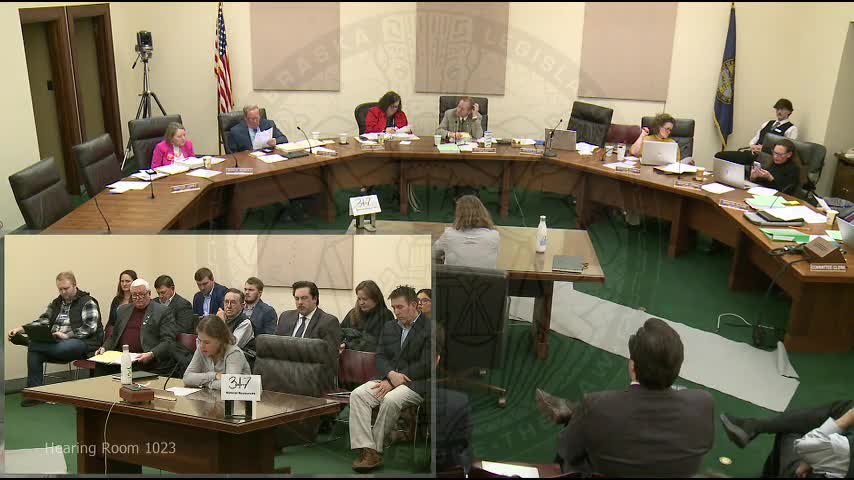Bill would require mitigation plans for large municipal or industrial water users in fully appropriated Nebraska basins
Get AI-powered insights, summaries, and transcripts
Subscribe
Summary
Senator Tom Brandt introduced LB344 to clarify municipal and large-user water mitigation in fully or over‑appropriated basins.
Senator Tom Brandt introduced LB344 in the Natural Resources Committee to clarify how municipal and large commercial or industrial water uses will be treated in areas the state has designated as fully or over‑appropriated. The bill focuses on the Platte, Republican and Upper Niobrara basins (and associated fully/over‑appropriated areas) and seeks to preserve municipal growth allowances while requiring mitigation plans for new or expanded large water users connected to municipal systems.
The nut graf: LB344 updates statutes that were originally enacted with a 20‑year exemption on municipal allocations; when that exemption expires on Jan. 1, 2026, the bill removes the potential for new allocations on municipalities and instead requires that large industrial users (defined in statute as over 25 million gallons annually) that attach to municipal supplies submit mitigation plans showing annual water use, volume returned to municipal systems or discharged elsewhere, and sources for mitigation. Proponents told the committee the change levels the playing field so commercial users that rely on municipal water cannot avoid mitigation costs that would fall on NRD taxpayers and the state.
What the bill would do
Jesse Bradley, interim director of the Department of Natural Resources, explained that the statute in question (section 46‑740 of the Groundwater Management and Protection Act) currently prevents municipalities from being allocated unless allocations existed before Nov. 1, 2005; that provision was scheduled to change in 2026. LB344 would strike the portion that would allow new municipal allocations after 2026 and instead require mitigation planning for new large municipal‑served industrial users. Bradley emphasized the bill applies only to basins designated as fully or over‑appropriated and "does not apply to Lincoln, MUD, or other areas of the State that have not been classified as fully or over appropriated." He told the committee that existing large industrial users that do not expand would not be required to take action under LB344.
Proponents’ rationale
Dr. Brandy Flier, hydrologist with the Central Platte NRD, testified for the Association of NRDs in support of LB344. She said the bill "provides a level playing field for all commercial or industrial large scale users regardless of whether they have their own well system or utilize a municipal water system," and protects NRD and state taxpayers from absorbing mitigation costs triggered by large users that connect to municipal supplies. Flier and other proponents noted the bill retains municipal flexibility to set allocations locally and to offer offsets to attract or retain businesses while ensuring water balances are maintained in fully appropriated basins.
Municipal response and context
Lash Chaffin of the League of Nebraska Municipalities testified in a neutral capacity and provided historical context: the two‑tiered approach in state law (an initial 20‑year exemption followed by the post‑2026 rules) resulted from extensive, negotiated work in the late 1990s and early 2000s to address regional litigation and basin management. The League cautioned the statute and implementing rules are complex and urged clarity for municipal officials and local partners on calculations and reporting requirements, particularly for consumptive‑use estimates and how mitigation obligations would be determined and applied.
Committee questions and technical points
Committee members asked whether the mitigation requirement should include reclamation or reuse plans for large processors; Bradley said the mitigation plan must account for consumptive use by reporting annual water used and returned and the source of mitigation, which could include reuse or other offsets. Senator Raybould asked whether very large facilities (for example, poultry or processing plants) should be required to detail water reclamation systems; Bradley said those operational details are part of the mitigation analysis the NRD and state would use to set offset requirements. The bill preserves NRD authority to set offsets and implement integrated management planning in designated basins.
What did not change
Proponents stressed LB344 does not change the current regulatory path for large users that already pump privately (self‑served wells); those users remain responsible for offsets under existing law. Instead, the bill clarifies that industrial users that hook to municipal water should face the same mitigation obligations as comparable self‑served operations.
Next steps
The committee heard the bill and took questions; no vote was recorded in the transcript. Sponsors and technical staff said the bill was coordinated with impacted NRDs and that maps and definitions of fully/over‑appropriated areas would be used in administering the requirement. The League of Nebraska Municipalities urged additional guidance to help municipalities carry out reporting and to ensure municipal economic development decisions reflect possible mitigation responsibilities.
Ending
LB344 seeks to balance municipal growth and economic development with basin‑scale water management by requiring transparent mitigation plans for large consumers attached to municipal systems in fully and over‑appropriated basins. The bill won support from NRDs; the committee requested detail and municipal‑facing guidance before final action.
